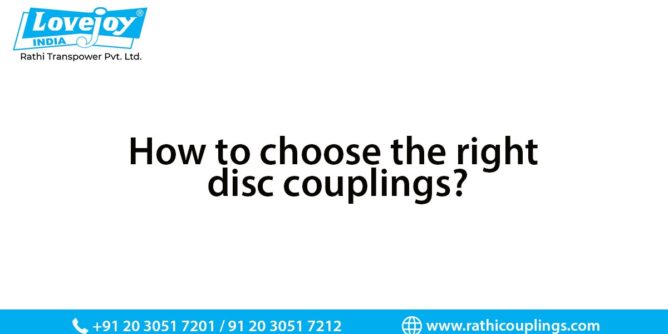
Disc couplings: Transfers torque from a driving to a driven bolt extraneously on a typical bolt circle.
Torque is transmitted between the bolts through a progression of thin, stainless steel discs gathered in a pack. Misalignment is cultivated by deforming of the material between the bolts.
Disc couplings are superior performance motion control (Servo) coupling intended to be the torque transmitting component while accommodating for shaft misalignment.
It is intended to be adaptable while remaining torsionally solid under high torque loads. Commonly, disc couplings can deal with speeds up to 10,000 RPM.
There are two unique styles of disc couplings:
Single Disc Style couplings are made out of two hubs and a single, flat, stainless steel plate spring.
Double Disc-Style coupling is likewise made out of two hubs yet has an extra centre spacer sandwiching two disc springs.
The middle spacer can be made out of a similar material as the hubs, yet is some of the time accessible in protecting joints, which makes the coupling electrically isolating.
The contrast between the two styles is that single disc couplings can’t suit parallel misalignment because of the complex bending that would be expected of the lone plate.
Double disc styles enable the two discs to twist in inverse ways to all the more likely oversee parallel offset.
Read More: How to install a Disc Coupling
The discs are fastened to the hubs with tight-fitting pins that don’t permit any play or reaction between the disc and the hubs.
The discs can be bent effectively and accordingly, disc couplings have the absolute least bearing burdens accessible in a motion control coupling.
Torsionally hardened and still adaptable, disc couplings are an extraordinary answer for rapid applications.
The drawback is that they are more fragile than the normal coupling and can be harmed whenever abused.
Exceptional consideration ought to be taken to guarantee that misalignment is inside the evaluations of the coupling.
A disc coupling is a kind of flexible coupling appropriate for high-performance control applications and can normally deal with paces of up to 10,000 rpm.
The coupling transmits torque from a driving to a driven bolt extraneously on a typical bolt circle. This torque is transmitted between the bolts through a progression of thin, stainless steel plates amassed in a pack.
The flexibility of these couplings originates from the deformation of the material between the bolts.
Disc couplings come in two varieties, a single disc and a double-disc. Single disc couplings are made out of two hubs, regularly made of aluminium or stainless steel, and a single, flat, stainless steel disk spring.
Double disc couplings are likewise comprised of two central hubs, yet highlight an extra spacer sandwiched between two disc springs.
This spacer can be made of a similar material as the hubs, yet can likewise be made with electrically detaching materials.
Past appearance, the contrast between these two kinds is the manner by which they handle shaft misalignment.
A single disc coupling can’t suit parallel misalignment in light of the flexing limitations of the solitary circle, however, the duel plate springs of the double-disc coupling enable it to flex in various ways.
This flexibility, however; has a drawback. While the coupling is appropriate for high-speed applications, it is likewise more delicate than most different couplings.
The disc springs can be effectively bent out of shape, which means the coupling can just deal with low bearing loads.
Read More: Flange Couplings
How to select the right disc couplings?
Disc couplings are intended to meet your necessities for torque, speed and balance but unfortunately, there isn’t one disc coupling design that meets the majority of the many coupling application requirements.
To guarantee you pick the correct circle coupling, you’ll need to ask these questions:
•What are the torque and speed requirements of your application?
•Do you require a highly engineered, modified structure?
•Is coupling weight a basic thought?
•Should the coupling be consumption safe?
•Are there explicit torsional solidness prerequisites?
•Are there specific industry particulars the coupling must conform to?
•What hub style and shaft fits are required?
•What is the normal misalignment for the application?
•Does the producer offer online devices to enable you to pick the correct coupling, for example, a selector or 2D/3D CAD drawings?
•How significant is the complete expense of ownership to you?
Rathi Couplings is a pan-India operation delivering high-end technologically advanced coupling manufacturers with best in class products and disc coupling manufacturer in India.
Reach out to us for all your industrial and manufacturing needs with affordable yet high-quality products.
